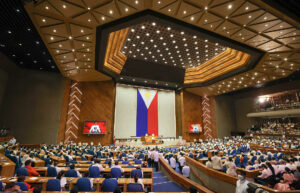A thumbs up or down for Marcos Jr.’s first SONA?

It was a brave declaration, said during the first State of the Nation Address (SONA) of President Ferdinand R. Marcos, Jr. as the 17th President of the Republic of the Philippines, that he knew it in his mind, he knew it in his heart, and he knew it in his very soul that the state of the nation is sound.
Let’s get our tenses right. If we are to believe President Marcos Jr.’s strategic plans would succeed, the state of the nation WILL be sound. But at the time he delivered his report to the Filipino people, inflation WAS a major problem, having breached the official target of 2-4%. Both our fiscal deficit and national government (NG) debt to GDP ratios WERE significantly high. COVID-19 WAS resurging. Economic scarring in both education and the labor market COULD BE a big obstacle to sustainable economic growth. Poverty and income inequality HAD worsened. While its prospects might be promising, the state of the nation is far from sound today.
Before that, he expressed his unqualified confidence in his cabinet for navigation through the global crisis, as well as his unwavering trust in the indomitable spirit of the Filipino for endurance.
It was right for him not to dismiss the risks of the global and domestic challenges we face today, but to focus more on the “sunlight filtering through these dark clouds.” This is the optimistic streak of a SONA.
Thus, it was easy for the business sector to give a thumbs up to the President’s agenda of governance. It sounds and looks business friendly.
The Employers Confederation of the Philippines, for instance, was impressed by the exhaustive coverage of the SONA, particularly its aim to improve healthcare in the Philippines. Their business sense must have been kindled by the call to build specialty hospitals for children, heart, lung, and kidney beyond the National Capital Region. The SONA also announced the administration’s intention to build the country’s own Center for Disease Control and a vaccine institute.
The siren song to the business people must be the President’s highly applauded announcement that “we will no longer implement a lockdown.” To business, it would be preferrable to implement the health protocols of wearing face masks and perhaps even face shields supported by widespread vaccination. This is how to dance with the virus.
True, lockdowns halt production and employment, even mobility and consumption. But time is suspended by lockdowns to give space for strengthening testing, tracing, and therapy. We doubt whether we have reached that point when these three Ts no longer need pump priming. Do we already have the digital database that would allow us to do granular isolation of specific areas to minimize harming the whole economy?
This decision is most welcome if the evidence is clear that our healthcare system is much stronger than when we risked opening up the economy sometime in 2021. Unless we are fully convinced that the President’s promise to fortify our healthcare is already on the ground, it may be difficult to simply rule out lockdowns, even if granular.
The Makati Business Club took the view that the proposals to facilitate tax payment and to boost internet interconnectivity would help “energize” the business sector. They believe digitalization would be helpful to small businesses.
But there is also an undeniable sense of ambivalence among the movers and shakers of Philippine business.
For one, the International Chamber of Commerce Philippines was reported to have saluted the SONA’s strong agenda for digitalization of all government processes, particularly on improving connectivity for the educational system and rural areas. They also liked the solutions in the SONA to address both food and energy security in the middle of the war in Eastern Europe.
Their support for digitalization is actually due to what it could contribute to good governance. The government is expected to be better run because red tape and corruption are reduced, if not eliminated. This is business-positive because the cost of doing business could drop. The SONA could have earned a great deal of goodwill if fighting corruption was given prominence.
On the other hand, the exporters’ group does appear ambivalent in their perception of the SONA. While admitting that most of the President’s legislative agenda already incorporated the wish list of the private sector, and the economic goals appear reasonable, the Philippine Exporters Confederation observed that the SONA failed to give strong emphasis on micro, small and medium enterprises (MSMEs) by asking Congress to enact the Magna Carta on MSMEs.
It was the Management Association of the Philippines (MAP) that indicated the strong position on what the SONA failed to show. While it was pleased with the inaugural SONA, it clarified that the government’s commitment to good governance by rightsizing the bureaucracy could always be undermined if corruption in government is not addressed. Statements to the effect that the government means business will not serve any purpose if the general public refuses to support it, given the reported irregularities in the bureaucracy.
For the Foreign Buyers Association of the Philippines, the SONA could have given the manufacturing industry more focus as this sector is expected to reduce the economy’s dependence on imports.
For the Philippine Chamber of Commerce and Industry, the SONA would have been more useful if it also proposed various ways to bring in more investments in the healthcare sector. This is its version of PPP (public-private partnership) in the healthcare sector to reduce the need for higher public spending and allow fiscal consolidation to be achieved faster.
For the farmers’ groups, they would like greater clarity on the imposition of a one-year moratorium on land amortization and interest payments. The Federation of Free Farmers believes that all amortizations should be waived, whether past, present, or future. In fact, for the Kilusang Magbubukid ng Pilipinas, such a suspension of amortizations has long been overdue.
Since power is critical to enable an economic recovery, the Marcos presidency ought to consider what the Power for People Coalition has to say about the contradiction between the government’s renewable energy agenda and its push for nuclear power and liquefied natural gas. “Renewable energy is a top priority not just by saying it, but committing to minimizing, then eliminating, the use of fossil fuels to protect the environment and consumers. It’s disappointing to hear him talk about incentives and [a] bill for gas and action point for nuclear but no actual plans for renewable energy.”
It is equally important to hear what the Philippine Energy Efficiency Alliance has argued about the government implementing the Energy Efficiency and Conservation Act to attain “the energy security and decarbonization objectives of the Philippines.”
The MAP’s point about the SONA’s failure to touch on fighting corruption is just one of those exclusions as we failed to hear any anti-corruption marching order from the Chief Executive. The SONA could have fortified its courage not to yield even a square inch of the Philippines by citing our victory in the Permanent Court of Arbitration six years ago. Resolving that maritime crisis should be good for business because the whole blue ocean economy west of the Philippines could be tapped, while maritime routes could also be secured. Respect for human rights and lives should have been a critical element in the SONA because business confidence is a function of peace and order. Justice and the rule of law assure investors that private property rights are upheld and any legal disputes can always be given due course.
The writers of the SONA should recall what the International Monetary Fund (IMF) once declared about good governance, that it is key to economic success. While good governance is a broad concept that is inclusive of economic policies, regulatory framework, and adherence to the rule of law, its absence does offer more opportunities for corruption, the abuse of public office for private gains. By skipping the strategy for good governance, the SONA might unwittingly work against market integrity, weaken competition and compromise economic growth.
A long recitation of the 19 legislative proposals and a potpourri of executive intent are praiseworthy. But an elephant still resides in the SONA. And it is not inflation. It is good governance.
Diwa C. Guinigundo is the former deputy governor for the Monetary and Economics Sector, the Bangko Sentral ng Pilipinas (BSP). He served the BSP for 41 years. In 2001-2003, he was alternate executive director at the International Monetary Fund in Washington, DC. He is the senior pastor of the Fullness of Christ International Ministries in Mandaluyong.




